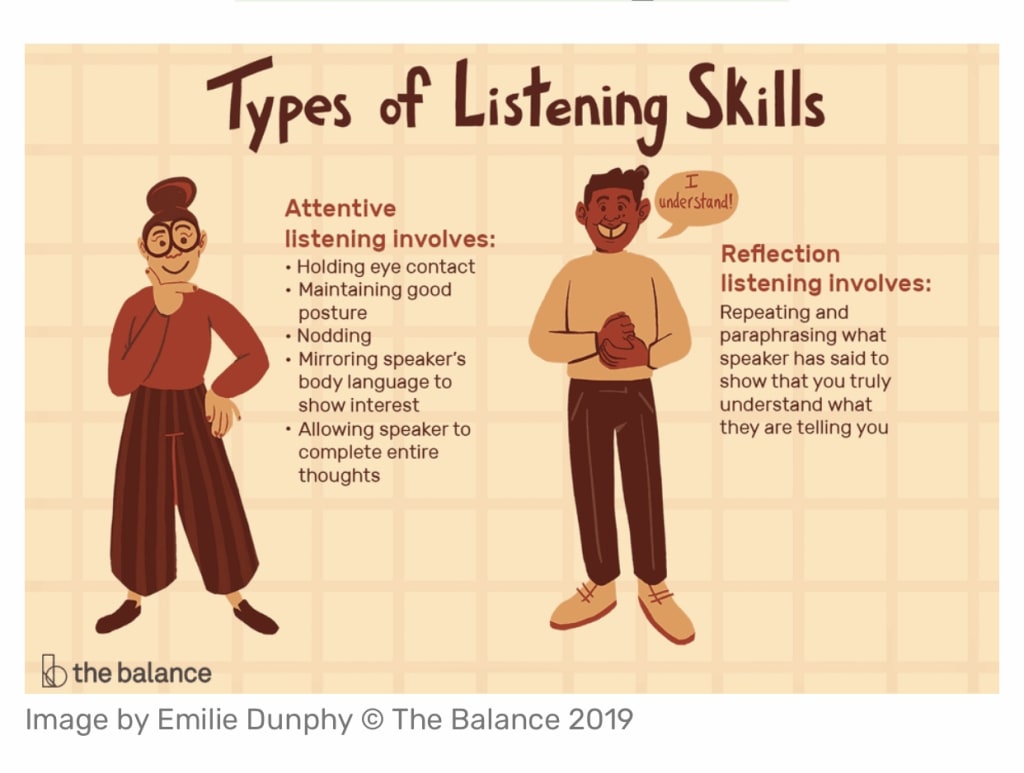Random Thoughts of a Village Idiot
Are You a Listener or a Talker?

We all have that one friend, that one friend who just does not stop talking. It seems they cannot stand the sound of silence. You're in the middle of a story, you stop for just a moment, and suddenly, whatever you were talking about sparked a thought in their head, and they just had this compulsive need to say it right there and then in the middle of your story. Almost as if they don't say it now, it will forever disappear from their mind. Conversations with this sort of friend are very scattered, with little continuity or depth. It's like they suffer from some form of undiagnosed ADHD. Small talk is the best type of conversation with such people.
In my half a century of life I have only met a handful of people who truly know the art and benefits of listening. And these people, I hold very dear. The world would be a much softer place if we learned how to listen. We talk so much about 'fluff' that we never get the opportunity to really know someone.
Fifteen years of policing taught me the importance and skills of listening. Listening determines your effectiveness as a police officer. Listening for information, for clues. Allowing a victim to vent without interruption releases stress for them, which allows them to remember and articulate the details with more clarity. I witnessed many police officers in such a hurry to fill in all the boxes required for their report, that they bombard the victim with question after question. A victim who has just suffered a crime, an event that will probably be the most traumatic moment of their lives, needs to work through their trauma. And just like a friend, sometimes all they need is to vent.
We need to be better listeners, for our partners, our children, our parents, friends, and co-workers. We need to be better listeners, so there are fewer miscommunications. We need to be good listeners, simply because that is what we love most about that one friend that we can go to. A friend who can listen without an agenda, advice, or judgment. A friend you can trust.
We might think that listening is just that. By definition, hearing is a physiological phenomenon; listening is a psychological act. We certainly have more talkers than listeners in today's world. There are courses, seminars, and books all explaining the art of 'active listening.'
Elements of Active Listening
Give your full attention. People watching is one of my favourite pastimes. One can learn so much just by observing. Have you ever been in a coffee shop and watched two people having a conversation? I can spot a talker from a mile away. One person is talking, the other person appears to be listening, however, if you look a little closer, you will see their mind appears to be distracted. They tend to look around a lot, as opposed to giving their full attention to the person sitting across from them. I must say, this is a pet peeve of mine, and I will only be victim to it once. To sit and share something of great importance and have that person all of a sudden look away as someone enters the coffee shop, is an instant door-closer for me. I will close up shop in a second. And cell phones, don't get me started.
Remain Silent—This is probably the most important aspect of listening. Let them know that you are listening. Head nods. If you are fully into the moment, the other will know that you are listening. You will be surprised if this is new for you. Chances are you will not be able to shut them up. Only time you should be talking would be to ask questions of clarification, and even those could be left until the time is right.
I used to be a cop, and sometimes you would have to work with another officer who was not your regular partner. Two cops in a cruiser is a very confined space to say the least. Either you are going like crazy from call to call, or you are waiting, which means you may have a lot of time to talk with your partner. If you are new to each other, there is either small talk (which many of us find irritating), laughter, or some pretty intense conversations. I always found it interesting, by the end of a twelve hour shift I could pretty much write a book on their lives. You see, when you listen and show interest, people are not used to this. I've had new partners, who, at the end of the shift will apologize for going on and on. They admit that they don't know why, but they just kept babbling on. Confessing they were surprised at how they just opened up about things. Things they have never even told anyone before. They don't know why they confided so deeply. It's because everyone loves to be 'truly' listened to. It is one of the greatest gifts one person can offer another, and it's free. I have many of people's secrets buried deep within me, and probably many I don't even remember.
Here are some simple strategies to try the next time you are sitting across from your wife, kids, friends, anyone actually.
1. Listen With Compassion and Empathy
Body Language. Make eye contact, this lets the other person know they have your full attention. Use head nods to indicate you are 'picking up what they're laying down'. If it gets emotional, you may wish to reach out and use touch.
Paraphrasing. With active listening, there is a time to speak. When you finally get to that moment of silence. When you feel they have have verbalized all their thoughts, fears, or excitement, this may be the time to speak. Here is where a little paraphrasing can go a long way. Summarize what they have just shared by saying, "So, let me make sure I am hearing you right." This will confirm that you truly heard what they said, and secondly by repeating it back it may reveal further insight.
2. Your Only Job—'Hold Space.'
If they are talking and it makes you think of something and you want to share it, stop yourself. Put it away for that moment, there will be another opportunity to share it. And if you forget it, well I guess it wasn't all that important. People do this all the time and I catch myself victim as well. There is nothing worse then when you are telling a story or speaking, and you take a moment to collect the remainder of your thoughts or have a sip of coffee and all of a sudden your friend says, "You know that made me think of bla bla bla..." You just destroyed the trust, interrupted the flow, all for some random thought that popped into your head. You are not a crow, stop getting distracted by any shiny thing that crosses your path.
3. Listen without judgment.
Let's face it, no one likes to be judged, and don't kid yourself; if you are judging it can be felt. A good listener, leaves themselves out of the picture. What they believe? What they would do in your situation? All this is irrelevant, false empathy really. You can reflect and process later when you have a moment to yourself.
A good example of how 'not to' do this would be my sister. She often asks me why her kids always tell me stuff. Then one day I was present when she was having a discussion with her teenage daughter, and she was trying to find out why she had been late coming home. It started off okay. Then she asked her this question which too was fine, the question was irrelevant. It's what she put at the end of the question. “What, and then you went to the mall, I hope you didn’t." See it? First of all when you are talking with your kids and you need answers, they are going to test you first. You will ask a question and they will give you only about 10 percent of truth, just to see your reaction. And let me tell you, if you go off on them, they will shut down right there and then, and you will never get the truth. However, if they start to tell you and you just keep quiet with a couple of head nods, they may give a little more with the next question and so on. As a parent this is not easy, because internally, you may be ready to lose your shit. I’m passionately telling you "bite your tongue" for the moment. You can deal with your shock, anger, disappointment, or whatever emotion it is you are feeling, later. That is if you really do want the truth.
You can start developing these listening skills at home or the office or anywhere really. You can practice this by Invoking the "code of silence." No need to go for too long periods, but this is where you begin a different way to communicate. It is mindful communication. Because you can't speak and say the first thing that comes to your mind like you normally would. So you think about it, and then by the time quiet time is over, you can share thoughts that you have actually put some time into. During these silent periods, you will find different ways to communicate. It forces you to use other forms of communication. A smile, a nod, or even a touch. This is fun to try at home with the whole family involved.






Comments
There are no comments for this story
Be the first to respond and start the conversation.